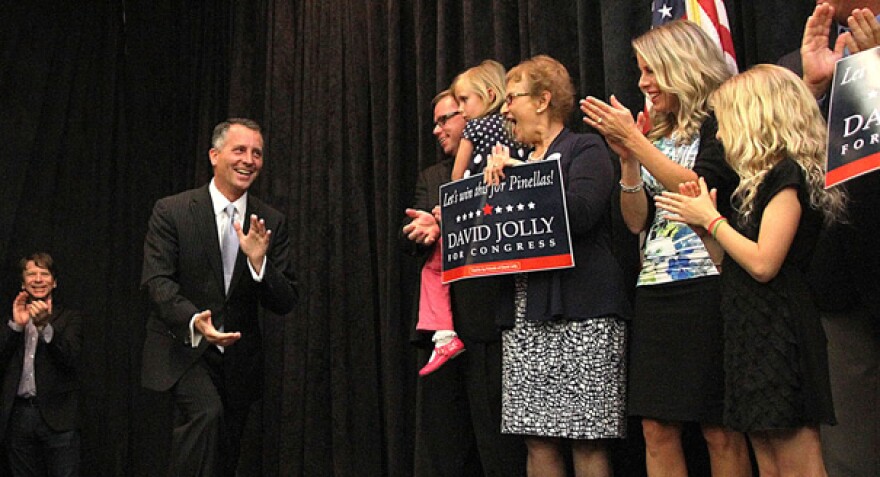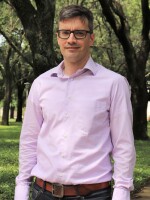David Jolly has his sights set on a new role in Florida — governor.
Jolly represented Florida's 13th congressional district, in Pinellas County, from 2014 to 2017. He left the Republican Party in 2018 and has spent the past few years advocating for more options for voters dissatisfied with the major political parties.
In April, he registered as a Democrat.
Jolly told "Florida Matters" that not only has his party affiliation changed, but so has his politics — including his views on abortion.
Jolly was born in Dunedin and grew up in Dade City. His father was a Baptist preacher, and when Jolly ran for Congress in 2014, he was pro-life.
In Jolly's interview with "Florida Matters," he told WUSF why his views have shifted.
David Jolly: I readily admit I wrongly conflated my faith teachings when I entered politics, my faith teachings around life with being anti-Roe, and as I grew and saw what the impact was on reproductive care during the Planned Parenthood debates, for instance, where I sided with Democrats, and certainly in the post-Dobbs environment, where the darker themes emerge, I am confident in saying that I'm for the codification of the Roe-Casey framework.
That's true at the national level. That's true at the state level. I think we should implement Amendment 4 [2024 Florida ballot initiative to expand abortion rights] that more than 50% of the voters asked for. But that is a journey. That is a journey.
And you know, former Gov. [Charlie] Crist used to say, "I never changed. I didn't leave the party. The party left me."
That's not my story. David Jolly changed, and I think a lot of voters have changed.
And so, where my critics like to come at me with, "Oh, but you've changed your mind." Yeah, that's not a weakness, that's a strength.
We need more politicians willing to admit they were wrong, and change and evolve and meet the moment where voters are.
WUSF: Maybe so, but it seems like we're in an era where voters are rewarding politicians who are hewing to one, kind of, set of views, and hewing pretty strongly to that. I mean, you mentioned Charlie Crist. He was a Republican when he was governor of Florida. He switched to the Democratic Party. Ran for governor as a Democrat again in 2022. He lost by nearly 20 percentage points. So what makes you think you can succeed where he failed?

Respectfully, I'm not Charlie Crist. As I mentioned, I've debated Charlie Crist. [Crist, another former Republican running as a Democrat, defeated Jolly for his House seat in 2016.] He insisted he never changed. I have changed, and I think voters want to see someone who has changed. I also think campaign election cycles are about meeting the moment and meeting voters where they are, and this is a moment in Florida where we have an affordability crisis during an election cycle where national voters are demanding change.
Maybe because it's the sixth month of a – or sixth year of a presidency. Maybe it's because the affordability crisis is crippling Republicans as much as it's crippling Democrats. But this cycle is a different cycle than past cycles.
People are demanding change. They don't want more of the same, and so I think if we lead into that cycle saying we can elect more Republicans and have more of the same, you can have your affordability crisis, or we can have change.
I know this is a statewide campaign, and you're setting your sights on communities all across the state, but you are from Pinellas County. You know the region, Tampa Bay, pretty well. What's your message to Tampa Bay area voters? Like, what would you say to them specifically to vote for you in 2026?
Look, I think the, I'm going to say it again: The affordability crisis in Tampa Bay is the same as around the state, but I think we especially experienced natural disasters and tragedy last year that are fresh on people's minds.
The ability to rebuild, the loss of lives. The property insurance market that has created home ownership to be perhaps unaffordable for many, a property tax crisis, roadways that are being tolled instead of open roadways for everybody. The education crisis is a lived experience in our community, where people are looking for a public school, but it's been starved of resources. Excellence in public schools today exist only because of the sheer will and determination and talent of our teachers and our administrators.
And I mean this, whether I'm a candidate or just a citizen, Tallahassee is not responding in this moment how we need them to respond. They're just not; they don't feel the urgency. They don't see the crisis. They are fine that Florida has become a home for the rich and the reckless.
I want a home — I want Florida to be a home for everyone, and I think most people in the Tampa Bay area and Pinellas County agree with that.
Republican congressman Byron Donalds, who launched his campaign for governor in February, released a statement calling Jolly an "anti-Trump radical leftist" who is "completely out of touch with Florida's voters and our values."
Hear the full interview on the "Florida Matters" podcast.




